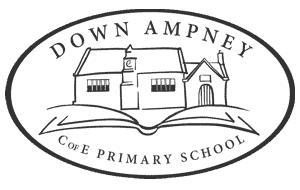
Teachers and teaching assistants are skilled in supporting pupils who have SEN and/or disabilities.
Ofsted
History
Intent
The intent of the History curriculum at Down Ampney is to instil a deep understanding and appreciation of the past, fostering pupils’ curiosity about the world around them and developing strong historical knowledge and skills.
The curriculum is carefully designed to ensure progression and coherence, enabling pupils to develop a chronological framework of British and world history and make connections between different periods. It aims to cultivate pupils’ critical thinking, analytical skills, and ability to evaluate historical sources effectively. We aim to promote pupils’ cultural capital and understanding of diversity, helping them make sense of the complexities of the world today through an understanding of the past.
History at Down Ampney inspires pupils to ask and answer questions about the past, investigating how events in history have impacted their lives today. We aim to help pupils develop an appreciation for the actions of our ancestors, our own actions and the impact they can have on our world, becoming compassionate thinkers who talk about historical events across the world with sensitivity and empathy.
Through History lessons, we teach children to ask perceptive questions, think critically, weigh evidence, sift arguments, and develop perspective and judgement when thinking about historical events.
We aim to enable children to understand the complexity of people’s lives; the process of change; the diversity of societies and the relationships between different groups, as well as their own identity and the challenges of their time.
Implementation
Teaching ensures that children have a strong understanding of chronology that builds, year on year, as well as an understanding of the key principles of significance, similarity and difference, cause and consequence, historical enquiry, and continuity and change. These strands run throughout our curriculum. An enquiry approach, the use of evidence and interpretations of the past feature in every topic, as they are fundamental to children’s understanding of the past.
Our History curriculum is shaped to enable children to know and understand the history of the British Isles as a coherent, chronological narrative, from the earliest times to the present day: how people’s lives have shaped this nation and how Britain has influenced and been influenced by the wider world. Children also gain a deeper understanding of significant aspects of the history of the wider world: the nature of ancient civilisations; the expansion and dissolution of empires; characteristic features of past non-European societies as well as the achievements and follies of mankind.
All year groups study key people of significance that have undertaken something that changed the lives of people at the time and have had an impact on either our locality or the wider world.
Our History topics are carefully chosen to reflect the identify of Down Ampney within the areas of Cirencester and Fairford. Investigating the area’s rich Roman heritage through first-hand site visits, museum trips and analysis of artefacts, and understanding the importance of Down Ampney within World War Two, allows children to appreciate the historical significance of certain locations, whilst drawing on their own local knowledge and experiences.
British values, including those of democracy, the rule of law, individual liberty and mutual respect and tolerance of those with different faiths and beliefs are embedded in the History curriculum. Children explore issues such as democracy in their historical context and relate them to the modern day, such as through Parliament Week. By looking at the achievements of famous British people, pupils develop an awareness of how they have influenced and shaped the country in which we live. By making links with modern day issues such as racism, pupils are made aware of the importance of British values over time.
Impact
The impact of the History curriculum is evident in the knowledge, skills, and attitudes of the pupils. Pupils demonstrate a solid understanding of key historical concepts and events, showing confidence in discussing and analysing historical issues. They are able to make connections between different periods of history and understand the significance of historical events in shaping the world today. Children are able to apply their knowledge from other curriculum areas such as the importance of rivers for trade routes or the geographical significance of key cities. Children are able to demonstrate their knowledge by completing bespoke end of unit knowledge organisers and complete pieces of extended writing, which enables them to showcase their understanding and skills and reflect back on to make connections during subsequent units of work.
Pupils’ critical thinking skills are well-developed, as evidenced by their ability to evaluate historical sources and construct reasoned arguments based on evidence. Pupils exhibit excellent communication skills, expressing their historical knowledge and ideas clearly and coherently.

